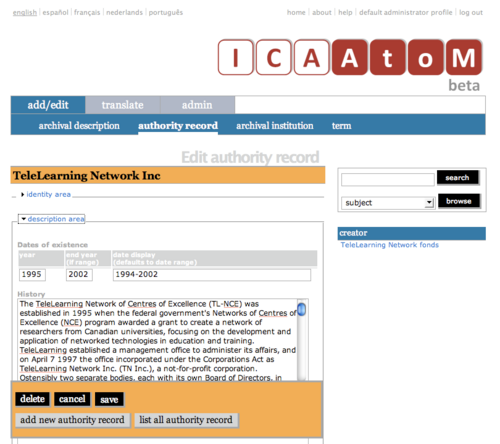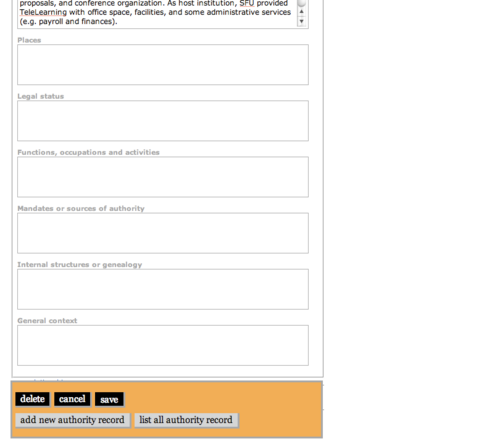Difference between revisions of "ISAAR description area"
| Line 9: | Line 9: | ||
| − | The ''description area'' contains fields for information "about the nature, context and activities of the entity being described" ([[RS-2#4.4.2|ISAAR(CPF) 4.4.2]]). With the exception of date-related [[Field|fields]] (see steps 1-3 below), all [[Field|fields]] are basic text fields. | + | The ''description area'' contains [[Field|fields]] for information "about the nature, context and activities of the entity being described" ([[RS-2#4.4.2|ISAAR(CPF) 4.4.2]]). With the exception of date-related [[Field|fields]] (see steps 1-3 below), all [[Field|fields]] are basic text fields. |
Revision as of 15:30, 22 July 2008
Please note that ICA-AtoM is no longer actively supported by Artefactual Systems.
Visit https://www.accesstomemory.org for information about AtoM, the currently supported version.
Authority record: Description area
Main Page > (UM) User manual > UM-3 Add / edit content > UM-3.2 Add / edit authority records > UM-3.2.5 Description area
The description area contains fields for information "about the nature, context and activities of the entity being described" (ISAAR(CPF) 4.4.2). With the exception of date-related fields (see steps 1-3 below), all fields are basic text fields.
1. Dates of existence
- "Record the dates of existence of the entity being described. For corporate bodies include the date of establishment / foundation / enabling legislation and dissolution. For persons include the dates or approximate dates of birth and death or, when these dates are not known, floruit dates. Where parallel systems of dating are used, equivalences may be recorded according to relevant conventions or rules. Specify in the Rules and/or conventions element (5.4.3) the system(s) of dating used, e.g. ISO 8601." (ISAAR(CPF) 5.2.1)
2. Year and End year
- Enter the start and end years of the entity.
- Leave end year blank if the entity is still in existence.
- Use four-digit numbers only.
- Do not use qualifiers (e.g. "ca.") or typographical symbols (e.g. "[197-]") to express uncertain dates.
- Start and end values will be used in searches (earlier than, later than) and sorting.
3. Date display
- Enter dates of existence as a date range (yearX - yearY).
- Add any qualifiers (e.g. "ca.", "predominant") and typographical symbols as required.
- This is the value that will appear in view mode as the dates of existence.
4. History
- "Record in narrative form or as a chronology the main life events, activities, achievements and/or roles of the entity being described. This may include information on gender, nationality, family and religious or political affiliations. Wherever possible, supply dates as an integral component of the narrative description." (ISAAR(CPF) 5.2.2)
5. Places
- "Record the name of the predominant place(s)/jurisdiction(s), together with the nature and covering dates of the relationship with the entity." (ISAAR(CPF) 5.2.3)
6. Legal status
- "Record the legal status and where appropriate the type of corporate body together with the covering dates when this status applied." (ISAAR(CPF) 5.2.4)
7. Functions, occupations and activities
- "Record the functions, occupations and activities performed by the entity being described, together with the covering dates when useful. If necessary, describe the nature of the function, occupation or activity." (ISAAR(CPF) 5.2.5)
8. Mandates or sources of authority
- "Record any document, law, directive or charter which acts as a source of authority for the powers, functions and responsibilities of the entity being described, together with information on the jurisdiction(s) and covering dates when the mandate(s) applied or were changed." (ISAAR(CPF) 5.2.6)
9. Internal structures or genealogy
- "Describe the internal structure of a corporate body and the dates of any changes to that structure that are significant to the understanding of the way that corporate body conducted its affairs (e.g. by means of dated organization charts). Describe the genealogy of a family (e.g. by means of a family tree) in a way that demonstrates the inter-relationships of its members with covering dates." (ISAAR(CPF) 5.2.7)
10. General context
- "Provide any significant information on the social, cultural, economic, political and/or historical context in which the entity being described operated." (ISAAR(CPF) 5.2.8)

